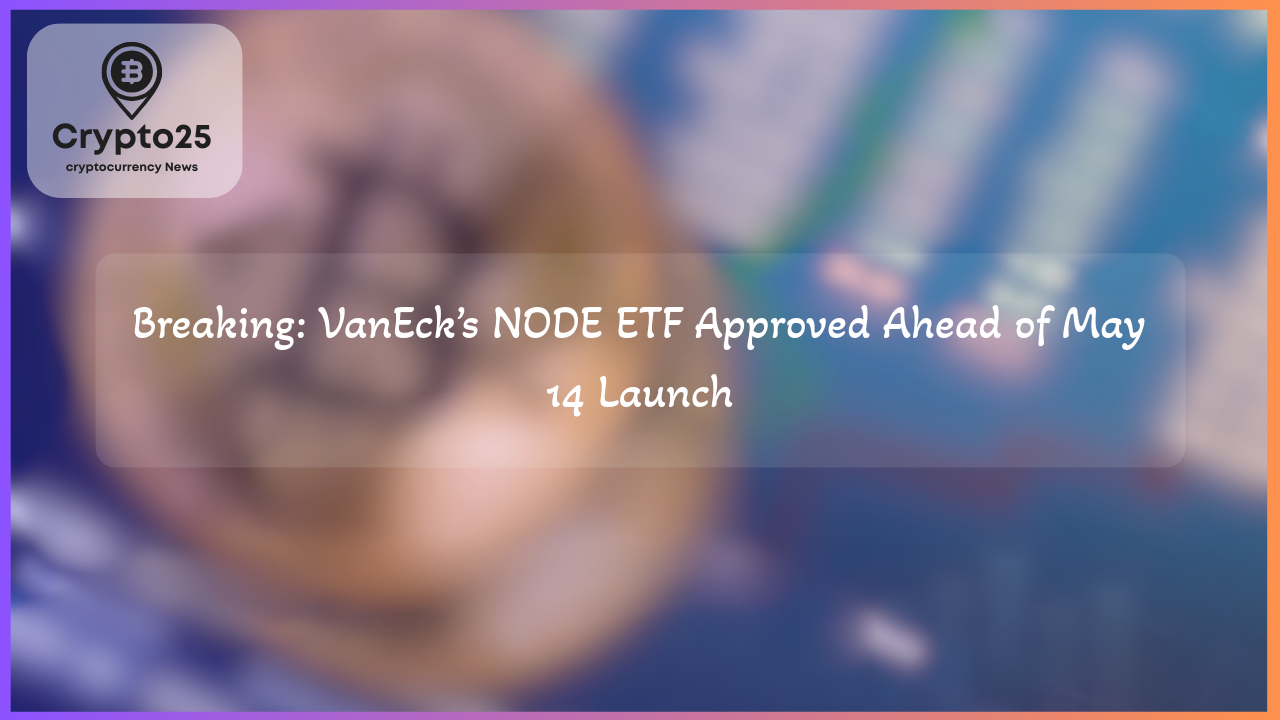
VanEck has secured regulatory approval for its latest financial product, the Onchain Economy ETF (NODE). This actively managed fund aims to provide diverse exposure to companies fueling the growth of blockchain and cryptocurrency industries. With a focus on innovation, NODE represents the firm’s commitment to bridging traditional finance with digital asset infrastructure while adhering to U.S. regulatory standards.
## VanEck’s Onchain Economy ETF: A New Take on Crypto Investing
The Onchain Economy ETF marks a significant milestone for VanEck, offering investors access to a wide range of companies driving blockchain adoption. Officially slated for launch on May 14, under the ticker NODE, this fund is uniquely positioned to capitalize on the advancements within the digital asset ecosystem. Unlike spot cryptocurrency ETFs, NODE won’t directly hold cryptocurrencies but instead focuses on public companies with active involvement in blockchain infrastructure or digital asset exposure.
Matthew Sigel, VanEck’s head of digital assets research and the ETF’s portfolio manager, explained that NODE brings a selective approach to the table. By carefully evaluating companies across various sectors—such as mining, data centers, and payment systems—the fund aims to construct a portfolio of 30 to 60 stocks from a pool of over 130 blockchain-focused firms. This active management strategy reflects the broader transition of traditional business models toward blockchain technology, further solidifying the ETF’s relevance. Additionally, NODE may allocate up to 25% of its portfolio to crypto-linked exchange-traded products (ETPs), offering additional flexibility for investors seeking exposure to the emerging digital economy.
## The Investment Strategy Behind the Onchain Economy ETF
VanEck’s filing with the U.S. Securities and Exchange Commission (SEC) outlines the focused investment strategy of the Onchain Economy ETF. It commits to allocating 80% of its net assets toward securities that belong to “Digital Transformation Companies” or digital asset-focused instruments. These companies primarily generate revenues through blockchain technology or distributed ledger systems.
To ensure a diversified portfolio, NODE includes small- and mid-cap entities, emerging market stocks, and foreign companies, broadening its global reach. The ETF will also allow for investments in securities denominated in foreign currencies, global depositary receipts, and even commodity-linked instruments. Enhancing its operational efficiency, VanEck structured the ETF with an offshore subsidiary headquartered in the Cayman Islands. This allows indirect exposure to commodity futures, swaps, and pooled investment vehicles, all while complying with U.S. tax laws restricting direct exposure to certain digital assets. However, the fund maintains a strict cap, limiting investments in this subsidiary to 25% of its total assets per quarter-end.
The ETF requires a manageable fee of 0.69%, further appealing to institutional and retail investors alike. Its framework excludes investments in stablecoins to align with its priority of targeting blockchain-driven companies that directly contribute to the ongoing digital transformation.
| Title | Details |
|---|---|
| Market Cap | $1.2 Trillion |
## NODE’s Role in Expanding Blockchain and Crypto Investment Opportunities
By leveraging an active management approach, NODE seeks to redefine crypto-related investment strategies. VanEck’s focus on companies in the blockchain and cryptocurrency ecosystems ensures that investors gain exposure to innovative sectors like data storage, hardware, and asset management. This approach not only minimizes the volatility frequently associated with direct investments in cryptocurrencies but also provides access to organizations on the forefront of digital innovation.
Launched after an extensive filing process beginning in January, this ETF builds upon the structure of existing crypto equity products but introduces a revised branding and investment scope. It positions itself as an exciting alternative for those seeking regulated exposure to the fast-evolving blockchain and crypto industries. Moreover, the ETF’s diversification strategy and global portfolio introduce opportunities in markets often overlooked by traditional investment practices.
Regulatory clarity enhances trust in products like NODE, offering investors confidence in the fund’s commitment to transparency and compliance. As blockchain-based solutions continue to transform financial systems worldwide, funds like NODE are likely to play pivotal roles in connecting mainstream investors with the potential of decentralized technologies.
VanEck’s Onchain Economy ETF sets a new standard for crypto equity funds, blending traditional methods with forward-looking strategies. With its May 14 launch, NODE is poised to attract investors eager to tap into blockchain’s transformative potential while minimizing exposure to the inherent risks of the digital asset space.
